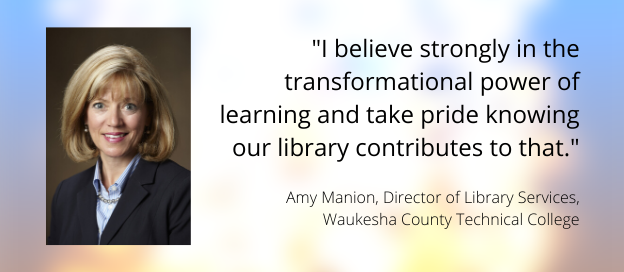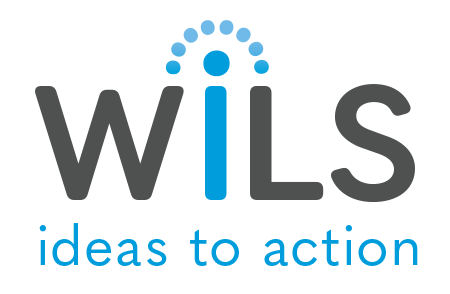
One of our greatest joys at WiLS is hearing our members tell the stories of the big and important work they are doing – interesting new projects or initiatives, or even interesting and new approaches to old projects. And, in addition to hearing about it, it makes us even happier when we can share those stories with other members. Each month, WiLS is proud to feature an interview with one of our library members.
This month, we interview Amy Manion, Director of Library Services at Waukesha County Technical College.
Why did you, personally, choose to work in libraries?
I’m not sure if I chose to work in libraries, or if libraries chose me! When I was in high school, our guidance counselors administered a career inventory to all the seniors called the “Major/Minor Finder” to help us prepare for college or the workforce. My results listed “Librarian” as the most appropriate occupation for me. I’m somewhat ashamed to admit that, at that time, I thought that sounded horrible and I had no intention of exploring that career option, even though I loved reading and spending time in libraries. My major in college ended up being Communication with a minor in English, and my first master’s degree was in English Literature from Hofstra University in New York. It was there that a professor noted how passionate I was about digging for information and that I was equally passionate about helping others. She suggested I consider a career as an academic librarian. Life circumstances prevented me from achieving that dream for a few years, so my first career was as an editor for a textbook publisher. Eventually, a move to Illinois allowed me to pursue my second master’s degree in Library & Information Science at Dominican University, after which I finally joined the ranks of our noble profession as a reference and instruction librarian—a dream delayed but ultimately realized. I have a poster of the American Library Association Library Bill of Rights framed and hanging on the wall of my office and I proudly reflect on the ideas and values expressed in it on a regular basis because they are ideas and values I share — values like equity, access, freedom of expression, and the enlightenment of all people. I believe strongly in the transformational power of learning and take pride knowing our library contributes to that.
What is unique about the culture of your library? How do you influence it?
There are two things I think are noteworthy about the WCTC Library. First is how much experience exists on our team. When I became director of library services in January of 2018, three staff members had over 60 years of employment combined among them. I consider myself very fortunate to have such a wealth of institutional knowledge available to me through them. I like to think that I have contributed by bringing some fresh, new ideas to our library like implementing LibChat and control over our web presence through LibGuides as our website homepage.
The second thing that sets us apart from other libraries I have worked in or used is the full integration of two other departments in our library space. We have five academic support centers and an IT service desk incorporated into our physical space, known as the Student Enrichment Center. Each of our departments has its own director or manager, separate budgets, and all three report to different supervisors. Yet, we work extraordinarily well together. I believe that students and other patrons are not aware that the staff who serve them are not all in the same department because we work together so seamlessly to benefit our users. Collaborating with other campus departments is one of our library’s greatest strengths, likely because we practice it every day in our own backyard. As a result, we now host and provide support and training for LibGuides or RefAnalytics data sets for eight other departments on campus, in addition to many other collaborative efforts like identifying resources for the multicultural student mentorship program, working with student organizations to create relevant resource displays, and providing information literacy expertise at faculty in-service events.
What do you think is important to know about the community you work with? What helps you understand their needs?
Like many technical colleges in Wisconsin, the most important thing to recognize about the community we serve is its diversity. We serve such a wide range of patrons from high school students in the Dual Enrollment Academy, to traditionally-aged college students who are pursuing a technical diploma or who intend to transfer to a four-year institution, to lifelong learners brushing up on skills with a few courses, to community members taking advantage of the resources we have to offer. Although we are an academic library serving an institution of higher education, in some ways we are similar to a public library. One of the best ways to understand the needs of such a disparate group is to ask them—and we do this every day. Our reference librarians conduct thorough reference interviews and all of our staff are adopting a coaching model designed to provide personalized support to all of our students. It is of the utmost importance to us that our students know we are here to assist them and that they can ask us anything, knowing we will endeavor to find answers with them in a nonjudgmental, helpful way.
What big ideas are being worked on at your library? What problems are being solved?
The biggest idea currently being worked on in our library is how to support the information and educational resource needs of students, faculty, and staff as the college transitions to a year-round academic calendar featuring eight-week courses rather than those in the traditional two-semester, 16-week timeframe. Because we anticipate that this change will result in more online instruction, we are exploring many delivery options like open educational resources (OER), virtual reference service, mobile hotspot checkouts, increased digital resources like ebooks and streaming film, and more. Our statistics show us that our students have traditionally valued face-to-face interaction with us, so we are determined to continue to help students in the ways that work best for them. We are preparing to meet this challenge head-on!
We are also working closely with our Office of Accreditation, Self-Study, and Assessment as a pioneer in the area of student services assessment. For the past three years, we have prepared assessment plans and reports that are designed to measure how our library contributes to the strategic goals, key initiatives, and Guided Pathways essential practices of the college as a whole. We continue to work on metrics that tell the story of how the library enhances learning on our campus.
These interviews are part of a series of interviews with both WiLS staff and members. Your feedback is appreciated. If you have any to offer on this article or suggestions for upcoming interviews, contact Andrea Coffin at acoffin@wils.org.
